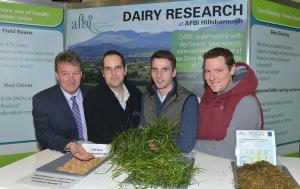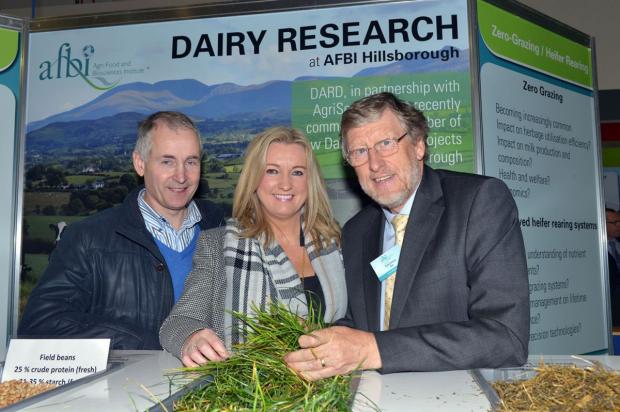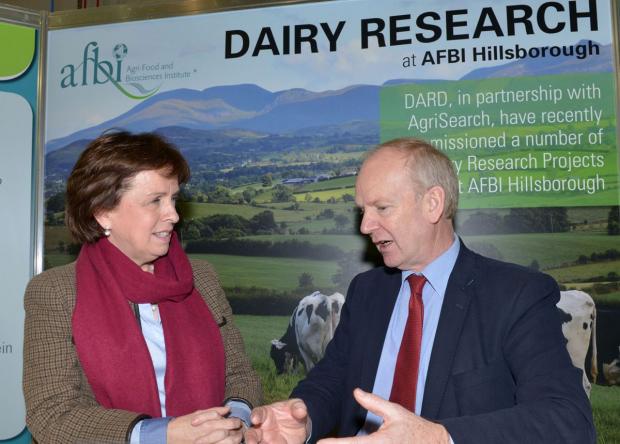The Agri-Food and Biosciences Institute (AFBI) highlighted its scientific work at the recent RUAS 30th Anniversary Winter Fair held at the new Eikon Centre, Balmoral Park at the Maze.

AFBI’s scientists were on hand to highlight:
- information on controlling BVD (bovine virus diarrhoea) virus infection in local herds;
- a number of new research projects being carried out at AFBI Hillsborough co-funded by both AgriSearch and DARD; and
- the importance of research being carried out at AFBI Crossnacreevy to determine the best grass varieties for farmers .
Dr John Bailey also gave a seminar on “Making best use of soil, manure and fertiliser nutrients for grass production”. In the presentation, Dr Bailey showed that high-yielding, high quality grass swards are essential if ‘Going-for-Growth’ targets for the dairy industry are to be achieved economically with minimum environmental impact. Soil-testing coupled with responsible manure distribution is vital to reduce the build-up of soil P and K concentrations in fields closest to farmyards and improve the productivity of more distant land with lower levels of soil fertility. Fertiliser nitrogen (N) and potash (K2O) should be applied to silage crops in accordance with recommendations. Some farmers are often applying too little fertiliser N, particularly for 2nd and 3rd cut crops, and as a result producing low yields of low protein forage. He emphasised that sulphur (S) deficiency is now a wide-spread problem for early season silage and grazing swards and that SO3-containing fertilisers ought to be applied routinely to all swards in spring to prevent this problem. Finally, Dr Bailey presented the rationale for the new soil P 2- and 2+ indices for grassland, and why, as a result of AFBI research, the European Commission has agreed that higher rates of P may now be applied at index 2- to counter P deficiency problems during mid-season.
BVD Eradication Programme

AFBI has long-lasting expertise in BVD and is supporting the local industry by providing advice and support for the programme at different levels. For example, AFBI’s research has improved the local knowledge on BVD and has influenced the design of the BVD eradication programme. In addition, AFBI is the only designated laboratory based in Northern Ireland and uses the latest PCR technologies to provide fast and reliable results. Furthermore, results are reported by qualified vets who are available for consultation.
DARD/AgriSearch Co-funded Research Projects at AFBI Hillsborough
Scientists from AFBI Hillsborough took the opportunity to highlight a number of newly commissioned research projects which are being co-funded by both DARD and AgriSearch. The first of these projects is designed to examine the potential of locally grown protein feeds in dairy cow diets, with the project focusing on red clover and field beans. Key questions which will be addressed are can ‘high protein’ clover crops can really allow concentrate protein levels to be reduced, and can field beans totally replace conventional protein ingredients in dairy cow concentrates?

Recommended List Grass and Clover Varieties
Eamonn Meehan and Gerry Hoppe from AFBI Crossnacreevy Plant Testing Station, discussed the Recommended List grass and clover varieties with a large number of dairy farmers. Their poster “Increased milk from forage reduces the cost of production” highlighted the fact that the best grass varieties for farmers in Northern Ireland are determined through testing at Crossnacreevy and published (online) in the Recommended List. Grazed grass is recognised as the cheapest method of feeding dairy cattle and by sowing the best grass varieties farmers can take further advantage of producing milk from forage. These recommended varieties have better combinations of yields, quality and persistence than non-recommended varieties. Their use in swards, if managed correctly, will lead to increased profit margins by reducing the cost of production.
AFBI also announced at the show the release of two new perennial ryegrass varieties, Moira and Fintona, from the Department of Agriculture (DARD) funded grass breeding programme at AFBI Loughgall. These new high yielding varieties will be commercialised in spring 2016 by Barenbrug UK Ltd who have been commercial partners of the Loughgall programme since 1991. Moira and Fintona have taken almost 15 years to develop, and are the latest addition to the extensive portfolio of high performance varieties which have been bred by AFBI, specifically for use on local farms. When choosing new varieties for use in Northern Ireland, AFBI advise farmers to consult the DARD Recommended List of Grass and Clover.
Notes to editors:
AFBI carries out high-quality technology research and development, statutory, analytical, and diagnostic testing functions for DARD and other Government departments, public bodies and commercial companies.
AFBI's Vision is “Scientific excellence in Northern Ireland … serving the world”.
All media enquiries to AFBI Press Office 028 9025 5326
Latest news
- AFBI Showcases the impact of its Science at this year’s Balmoral Show 29 April 2025
- Finding the needle in a haystack: eDNA as a Surveillance Tool for Plant Pathogens in Northern Irish Forests 23 April 2025
- AFBI issues Nematodirus warning – Spring 2025 11 April 2025
- Managing Nature Based Risks to the UK Economy and Opportunities for Green Finance 08 April 2025
